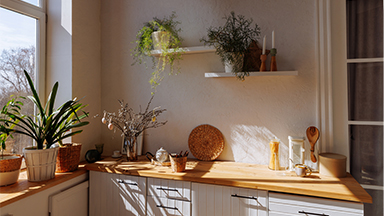Some tips on searching for a new property, whether you’re an owner-occupier or investor
So you’ve crunched the numbers, filled out the spreadsheets and worked out how much you can afford to borrow. Now it’s time for the rubber to hit the road and start searching for a property within your budget.
There’s plenty to think about when you start your property search. Are you looking for your own home or an investment property? Would you prefer an apartment, a freestanding house or even a townhouse? Do you need to be close to family, transport or schools?
Doing your research first will help you get clear on your options.

What to look for when buying a property to live in
As an owner-occupier, you’ll need to think about every aspect of day-to-day life.
You can’t necessarily have it all. Sometimes you might need to make a few compromises on that dream home.
It could be a good idea to make a list of nice-to-have versus must have. We’re all different so be honest with yourself. What’s more important to you—weekdays or weekends? Location or size? Backyard or Bosch? Unless you’re lucky enough to be investing lottery winnings, be prepared to make a few trade-offs.
Is being able to walk to the train station more important than an extra ensuite? Is being near a school more important than a big backyard? Is being within cooee of a funky shopping strip more important than that extra bedroom if nanna comes to stay?
Even a couple of streets further away from local amenities can make a surprising difference to the asking price.
And if you’re planning on starting a family, you’ll need to think about whether local childcare, playgrounds and parks are going to become more important than being able to stroll down the road to pick up a spelt loaf from the artisan bakery.
Research the area where you’d like to buy. It’s worth investigating:
- recent sales in the area and the neighbourhood to give you a read on what you can expect to pay
- if there are any planned developments nearby…check with the local council to find out how they might affect the future value of your property.
What to look for when buying a property to rent out
As an investor, you’ll need to put yourself in the shoes of a potential renter. Some of the things you’ll look for could be as important to attract tenants, such as proximity to transport. Others you could move down your checklist—like proximity to schools.
If there are plenty of attractive properties to rent in your chosen suburb, you might need to upgrade the bathroom or give the place a lick of paint.
Conversely, if there’s high demand then you might not be quite so concerned about updating the décor or fitting a new kitchen if the place is serviceable.
Unlike buying a home to live in, the goal when buying an investment property is to make money via rent and potential capital growth. It’s a good idea to decide whether you’re focused more on earning a steady income, or a longer-term capital growth. Then research the property’s potential for capital growth, rental income and ongoing costs.
You might consider:
- current rental yields in the area to see what you can realistically expect from your property
- the vacancy rates in the area to find out if there are a number of properties struggling to find tenants.
7 useful tips when you’re searching for a new home
OK, so you’ve found a property that ticks the important boxes. What next?
1. Visit the property at different times
You’d be surprised at the difference a day makes. Your 10am inspection on a Saturday may mean you miss seeing the huge amount of school traffic during the week.
2. Check for mould, cracks, sagging ceilings, rusty roofs and gutters
You don’t always need an expert. There may be signs of structural problems obvious even to the untrained eye.
3. Get building, strata and pest inspection reports
You might baulk at the cost but they could be worth their weight in gold. While they’ll add to your upfront costs, these reports can reveal issues that may not be obvious when you inspect the property and can potentially save you money down the track.
4. Get legal advice
You don’t want to cut corners and come unstuck down the track because you didn’t read the fine print. Always have an expert solicitor or conveyancer check over the contract and other legal issues like what the council allows. Is the property in a heritage zone if you’re planning to renovate?
5. Check the parking situation
You don’t want to be moving your car at 6am every day to reverse park into the neighbour’s spot. See if there’s off-street parking and proximity to public transport.
6. Explore the local amenities
You may not want to be getting in your car every time you need a litre of milk. Areas with good schools, shops, as well as access to public transport will appeal to owner-occupiers and tenants alike.
7. Decide whether you’re prepared to renovate
You’ll need to be honest with yourself. When you read the phrase ‘Bags of potential’ underneath a picture of lurid lino, cracked walls and fading curtains, do you get a shiver of anticipation or dread? Even if you’re a keen DIY enthusiast, buying and doing up a renovator’s delight can cost a fair amount in the long run—in dollars, time and potentially fractured family relationships. And while you’re doing the place up you’ll need to live in a situation that could be less than ideal, especially if you have a young family. On the upside, being prepared to take on a challenge can open up new suburbs and get you into your suburb of choice at a more affordable rate.
Buying off the plan – the potential upside…
Buying ‘off the plan’ simply means purchasing a property that hasn’t been built yet.
Typically, you’ll only need to pay a deposit upfront before the property is constructed. While you won’t be able to move in or rent it out for some time, it will allow you extra time to save before your purchase is settled.
Another potential advantage is that you can lock in today’s price for the property, even though you may not finalise the settlement for a while, potentially a year or two down the track. By the time construction is finished, the property may be worth more. This could be advantageous in a market with rising property prices.
…and what could go wrong
Buying off the plan is not without risks. The property market can fluctuate, and if prices fall during the construction period, you may find you’ve overpaid relative to prices at the time of the property settlement. This can pose problems when you need to get a loan to purchase the property, as the lender may not provide the full amount you need to borrow. If you can’t make up the difference, you risk losing your deposit and may be unable to purchase the property.
Another risk is if the developer goes bankrupt, you may lose your deposit as you’ll be in line with other creditors trying to get money back. You should research the developer for the project and check their track record to make sure they’re reputable. Construction delays are also a risk, as well as the possibility that the end result isn’t what you anticipated. To manage these and other risks, get professional legal advice to make sure the sales contract includes terms that can protect you, but be mindful that not all risks can be mitigated via the sales contract.
Subscribe to our newsletter

Tax time checklist for property investors
17 June 2024 | Blog If you have an investment property, here are some tips to help you prepare at tax time Read more
8 tips to get a harder-working home loan
14 June 2024 | Blog There are many ways you can get your home loan to work harder – from setting up an offset account to reduce the interest you pay, to consolidating your debt. No matter what package you have, you can take control of your repayments and build your financial resilience. Read more
Rising home loan interest rates explained
25 May 2023 | Property Find out all you need to know about rising interest rates plus tips on managing your home loan. Read moreWhat you need to know
This information is provided by AWM Services Pty Ltd (ABN 15 139 353 496), is general in nature only and hasn’t taken your circumstances into account. Before deciding what’s right for you, it’s important to consider your particular circumstances and read the relevant product disclosure statement or terms and conditions available from AMP at amp.com.au or by calling 131 267.
Read our Financial Services Guide for information about our services, including the fees and other benefits that AMP companies and their representatives may receive relating to products and services provided to you. All information on this website is subject to change without notice. AWM Services is a part of AMP group.